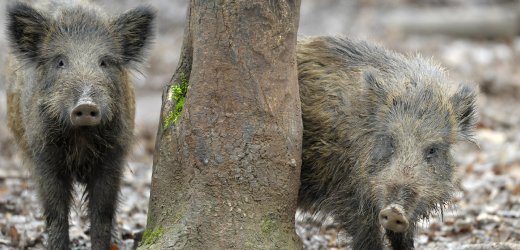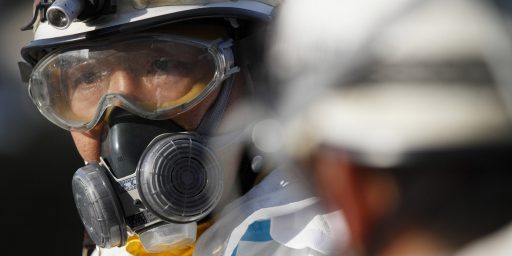Radioactive Boar Incidents on the Rise
German government payments compensating hunters for lost income due to radioactive boar have quadrupled since 2007.
Tyler Cowen nominates this for the Best Sentence About Germany I Read Today:
Government payments compensating hunters for lost income due to radioactive boar have quadrupled since 2007.
It would be hard to beat that! One imagines that this is the nanny state gone awry. But no!
It’s no secret that Germany has a wild boar problem. Stories of marauding pigs hit the headlines with startling regularity: Ten days ago, a wild boar attacked a wheelchair-bound man in a park in Berlin; in early July, a pack of almost two dozen of the animals repeatedly marched into the eastern German town of Eisenach, frightening residents and keeping police busy; and on Friday morning, a German highway was closed for hours after 10 wild boar broke through a fence and waltzed onto the road.
Even worse, though, almost a quarter century after the Chernobyl nuclear meltdown in Ukraine, a good chunk of Germany’s wild boar population remains slightly radioactive — and the phenomenon has been costing the German government an increasing amount of money in recent years.
According to the Environment Ministry in Berlin, almost €425,000 ($555,000) was paid out to hunters in 2009 in compensation for wild boar meat that was too contaminated by radiation to be sold for consumption. That total is more than four times higher than compensation payments made in 2007.
The reason for the climbing payments, of course, has more to do with Germany’s skyrocketing wild boar population than with an increase in radioactive contamination. “In the last couple of years, wild boar have rapidly multiplied,” a spokesman from the Environment Ministry confirmed to SPIEGEL ONLINE. “Not only is there more corn being farmed, but warmer winters have also contributed to a boar boom.”
Those boars aren’t going to kill themselves! And they need killing. But who’s going to do it if they can’t eat or sell the meat?







I found this article extremely confusing. IMO, if the reported phenomena are true, it reflects excessive concern on the part of German officials much more strongly than it does any appreciable public health risk posed by eating radioactive boar. By my back-of-the-envelope calculations if you consumed 20 lb. of the most highly contaminated boar meat (7,000 becquerel/kg.) it would be about the equivalent of getting a hip X-ray.
I’ve eaten wild boar. I don’t think I could eat a pound of it a year let alone 20 pounds.
To put it another way I’d get a higher dose of radiation flying to Germany than I would by consuming German wild boar. Why aren’t the German authorities banning air travel?
Dude, why aren’t they banning the production of weird fetish porn? Why aren’t they banning German pop music? Why are they requiring me to tone down the violence in my books and remove all references to religion? Why are they building cars that require me to use Chevron and not much cheaper Costco gas?
So many questions about the Germans . . .
I think that’s a proscription that most right-thinking people could get behind.
“Those boars aren’t going to kill themselves! And they need killing. But who’s going to do it if they can’t eat or sell the meat?”
Perhaps the NFL could offer to buy all the pelts (or whatever it is a wild boar has).
That article gives me more questions than answers. Germany is quite a distance from Chernobyl, first off. I don’t remember much about the disaster, but typical weather systems would have presumably carried radioactivity to the east of Chernobyl, whereas Germany is, of course, to the west.
I also wish they would explain why mushrooms and other boar munchies would continue to have the same levels of radioactivity OR MORE in the future. Why? The article just treats this like a matter of fact, but it’s bewildering on its face to me.